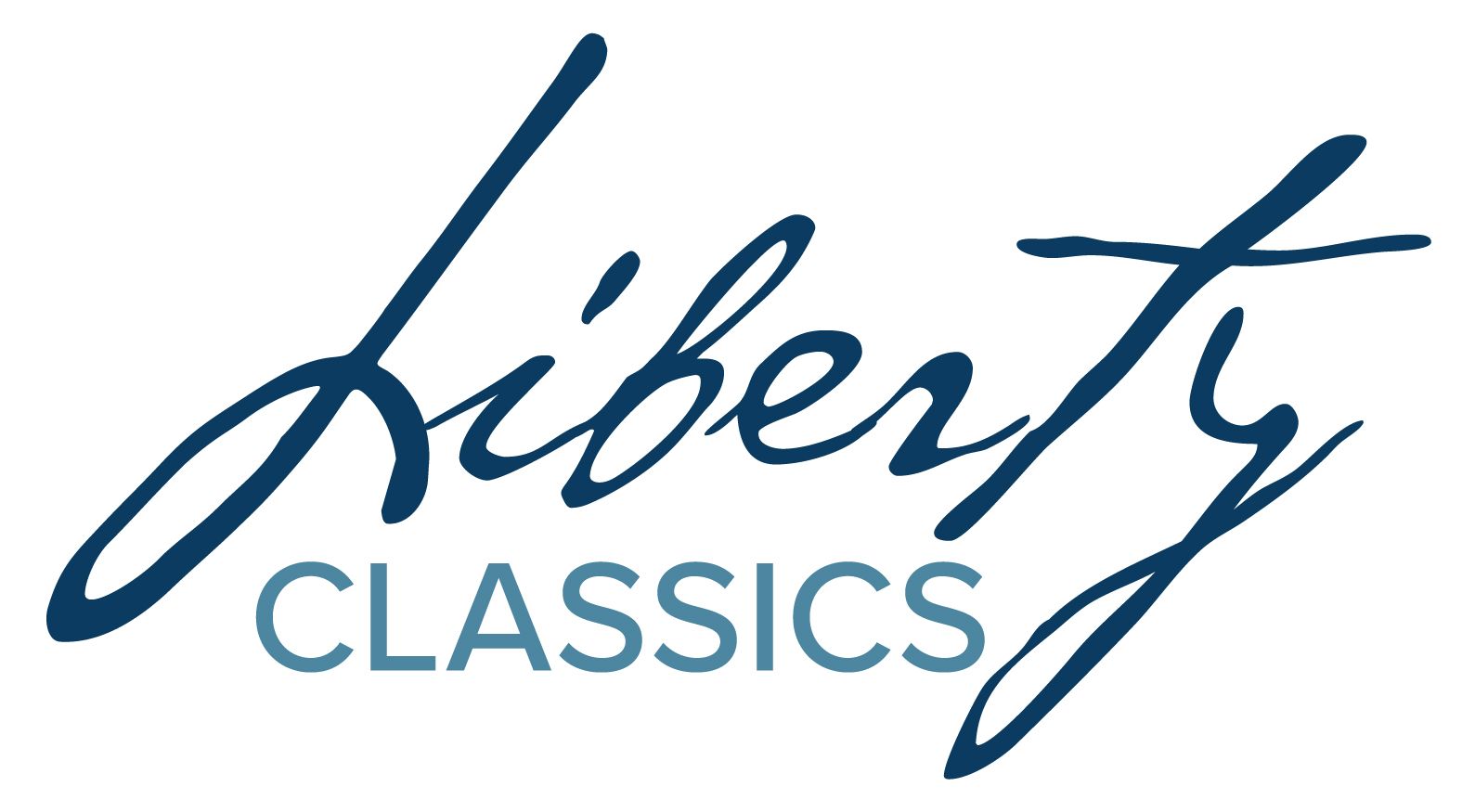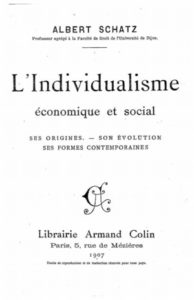Liberalism and Laissez-Faire in Albert Schatz's Economic and Social Individualism
By Pierre Lemieux


- A Liberty Classic Book Review of L’Individualisme économique et social. Ses origines, son évolution, ses formes contemporaines (Economic and Social Individualism: Its Origins, Its Evolution, Its Contemporary Forms), by Albert Schatz.1
Albert Schatz (1879-1940) was a professor in the Faculty of Law of the University of Dijon in France. His 1907 book L’Individualisme économique et social. Ses origines, son évolution, ses formes contemporaines (Economic and Social Individualism: Its Origins, Its Evolution, Its Contemporary Forms) is based on a course on the History of Economic Doctrines he gave to doctoral students. His goal, he explained, was to provide a synthesis of many great and diverse works on individualism. He was not very well known, even in France, and the book was never translated.
Schatz and Hayek
In his 1945 lecture “Individualism: True and False,”2 Friedrich Hayek distinguished the “true individualism” of English and Scottish liberals in the tradition of David Hume and Adam Smith, based on a conventional spontaneous order, from the “false individualism” of the continental and rationalist tradition (the Physiocrats, Rousseau, the Encyclopedists, and others) which, he claimed, leads instead to socialism. In this article, Hayek praised Albert Schatz’s book “to which,” he said, “I am much indebted.”
Schatz and Hayek share many ideas. Schatz also claims to defend the empiricist and anti-rationalist version of classical liberalism: “The spontaneous order of societies answers to reasons that Reason does not know,” he writes. They both see subjective ideas as social facts that guide individual actions. They both criticize “social justice.” They both reject social constructivism and rationalist “natural rights.” Schatz speaks of “the empty concept of ‘natural rights,'” which the 18th-century school of the Physiocrats and many French 19th-century economists defended.
But the two thinkers are more different than they appear at first sight. Their individualism is not the same “true” individualism. If both conceive society as a grouping of individuals and agree that we must start from the latter to understand the former (methodological individualism), Schatz’s adds other individualist principles of ethics. He seems to adhere to simple act utilitarianism as opposed to Hayek’s rule utilitarianism. A symptom of their differences is that Schatz includes in the individualist traditions many thinkers that Hayek puts in the false individualism strand, such as Herbert Spencer (1820-1903) or John Stuart Mill (1806-1873).
Schatz calls Mill “the true representative of economic individualism” and “the individualist spirit.” On the contrary, Hayek places Mill at the origin of the branch of classical liberalism that forked into socialism. He blames Mill for his rationalism and constructivism in opposing conventional rules and proposing redistributionist social reforms (see The Fatal Conceit, University of Chicago Press, 1988). Hayek criticizes Mill for his socialist tendencies, while Schatz declares the latter’s theory of justice “incompatible with socialism.”
Liberalism in France
Schatz focusses on another intellectual fork, this one in French classical liberalism. He argues that Frédéric Bastiat (1801-1850) and the 19th-century school of “orthodox liberalism,” based on a providential view of economic harmony, turned into a cult that discredited economic liberalism in France. It is true that Bastiat, despite his talents at economic vulgarization, did not contribute to the advancement of knowledge. Economic liberalism, Schatz argues, was thus evicted by a wider current of political liberalism and individualism, represented by Alexis de Tocqueville (1805-1859) or Benjamin Constant (1767-1830), and by theoreticians of pure individualism.
He provides an interesting explanation of why the development of economics was stymied in France. The system of French universities created by Napoléon Bonaparte in the early 19th century accommodated only four faculties: Law, Medicine, Letters, and Sciences. (This explains why Schatz was a professor in a Faculty of Law.) There was no room for new disciplines such as Political Economy, which took refuge in Law or in specialized professional schools. The system lasted until the end of the 19th century. As a consequence, writes Schatz, “French economists have been statesmen, financiers, journalists, philanthropists, but not professors.”
A good argument can be made that Schatz dismisses French laissez-faire economists a bit too summarily. A typical representative, Charles Dunoyer (1786-1862), argued for limiting the role of the state to its area of specialization: security (police, justice, national defense). Gustave de Molinari rejected even that function and thus became the first anarcho-capitalist economist. For Schatz, such anti-statist ideas “went over the limits of common sense,” although he does not really grapple with Molinari’s arguments. In many ways, Schatz was too much of a liberal moderate.
Individualist Theory
Yet, it is probably correct to say that classical liberal economists were replaced in French discourse by theorists of individualism who, like Mill, emphasized that liberty is only a tool for the goal of individual development. Besides political liberals such as Tocqueville and Constant, Schatz includes in the individualist tent a wide variety of thinkers. Many were more conservative than classical-liberal like historian and critic Hippolyte Taine (1828-1903). Even more controversial is historian Ernest Renan (1823-1892).
Schatz’s arguments for including Herbert Spencer in the individualist school are more persuasive. Although Spencer started his analysis from an organicist conception of society, he ended up with a defense of individual rights. He realized that the “cells” of the social organism are not mindless like those of a biological organism. Schatz valorizes lesser known theorists of individualism, such as Gabriel Tarde (1843-1904) and Georges Palante (1862-1925): although they professed to be anti-liberal, he argues, they were close to economic liberalism.
Schatz also reviews the theories of eccentric individualist anarchists, such as Pierre-Joseph Proudhon (1809-1865) and Max Stirner (1806-1856). Schatz considered the ideas of such individualist anarchists as those of “madmen” (déments in French). Ignoring the “hereditary experience” of societies and the protective role of government, he believed, would bring back Hobbes’ war of all against all.
The last chapter of L’Individualisme économique et social argues that individualism splits in two varieties. The standard form, democratic individualism, is indistinguishable from classical liberalism in the Anglo-American tradition. The other variety is “aristocratic individualism.” It rejects the idea of “natural equality,” accepts inequality as a fact of nature, and aims at maximum individual development given each person’s capacities. A natural elite or aristocracy composed of “strong individualities” will emerge and exert its influence over weaker individuals, for the economic and moral good of everybody. The free circulation of elites will assure that declining ones are replaced by new ones, as explained by sociologist and economist Wilfredo Pareto (1848-1923). Schatz himself stands on the aristocratic side of individualism.
What matters in aristocratic individualism are individuals, not groups or classes. “There is no superior class,” wrote Georges Palante, “only individual superiorities.” Aristocratic individualism has nothing to do with the sort of racial superiority defended by Thomas Carlyle (1795-1881) in Scotland or Joseph-Arthur de Gobineau (1816-1882) in France. As for the main theorists of aristocratic individualism, Schatz identifies Ernest Renan in France, philosopher Friedrich Nietzsche (1844-1900) in Germany, and playwright Henrik Ibsen (1828-1906) in Norway. Ibsen argued that the majority is always wrong because there are more imbeciles than intelligent people; and that the state amounts to worshiping the populace. Theorists of aristocratic individualism hated the state.
Hayek could not have generally agreed with such theories of aristocratic individualism, which were rationalist, tended to be anti-social, and largely ignored the spontaneous order of society. They did not correspond to Hayek’s “true individualism.” It is not clear how Renan, who was a nationalist and an anti-Semite, could be coopted in liberal individualism. Schatz’s very broad definition of individualism has its drawbacks.
A 19th-century man, Schatz believed that socialism was the main if not the only enemy. He was not far from thinking that everything non-socialist was good. He wrote that individualism and socialism were the “two broad doctrines fundamentally opposed,” the “two tendencies in the human mind.” From our vantage point more than a century later, the reality is a bit different. Collectivism—the bias towards collective rather than individual choices—is, rather than socialism, the real opposite of individualism. And we find much collectivism in practices and doctrines that don’t claim to be socialist. Just look at today’s political debates in America.
A Fear of Laissez-Faire
Protectionism provides an example of a collectivist policy espoused by conservatives as well as by socialists. Speaking of the freedom to trade internationally, Physiocrat Guillaume-François Letrosne (1728-1780) had a clearly individualist approach: “We want it full, total, irrevocable, always and everywhere. It is not just exportation that we want free, we want total liberty.” Before him, the Marquis d’Argenson, an Enlightenment figure, had explained how it was impossible for the state to efficiently control commerce. In his memoirs, he coined the famous motto “Laissez faire, morbleu! Laissez faire. (“Morbleu” is a French swear word originally meaning “by the death of God.”)
“Laissez faire” or “laissez-nous faire” (“let us do”) was the answer that a merchant named Legendre later reportedly made to Jean-Baptiste Colbert, minister of Finance under Louis XIV, who had asked what the king could do to assist commerce. “Laissez faire” is an injunction to let us free. The derived substantive is “laissez-faire.” However, it is sometimes written as “laisser-faire,” which, by analogy to “laisser-aller,” connotes an attitude of scruffiness. It is consistent with Schatz’s reserve towards the laissez-faire defended by French economists in the 18th and 19th-century that, after explaining the origin of the correct expression “laissez-faire,” he uses the arguably pejorative “laisser-faire.”
Schatz is not necessarily wrong to think that some state interventions can be justified in a theoretically minimal state. After all, Robert Nozick himself defends reparatory redistribution or compulsory insurance for certain risks (see his Anarchy, State, and Utopia, 1974). But the author of L’Individualisme économique et social comes short in explaining his disapproval of laissez-faire and where exactly state intervention should stop. He suggests that government intervention is a matter of expediency. Hayek would argue that it is a matter of principle—traditional, non-rationalist principles perhaps, but principle nonetheless. Schatz even believes that the role of the modern state must naturally grow. Why? How?
In other words, Schatz underestimates the arguments for laissez-faire in the classical liberal tradition, and he only partly compensates by stressing the moral value of the individual. These are, of course, complex issues, and Schatz did not have the benefit of what we have learned over the past century. The very fact that his book leads us to ponder these issues with the help of many great thinkers testifies to its interest.
Footnotes
[1] The original French version L’individualisme économique et social: ses origines – son évolution – ses formes contemporaines, by Albert Schatz, is available in Liberty Fund’s Online Library of Liberty.
[2] Reprinted in Studies on the Abuse and Decline of Reason, by F. A. Hayek. Liberty Fund, Inc.
